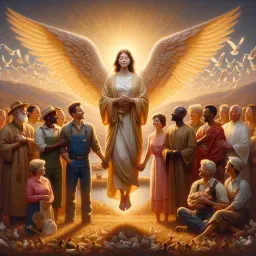”Infinite goodness has such wide arms,
that it embraces all that turns to it“

- Meaning
- The phrase aims to highlight the vastness and mercy of divine goodness, which embraces and welcomes all who seek it or entrust themselves to it. It signifies that God's love and goodness are so vast and inclusive that no one is turned away; rather, all find welcome and salvation. This concept fully reflects the theological ideas of Dante's time, viewing God as the source of all goodness and grace.
- Allegory
- The celestial embrace represents the infinite goodness mentioned in the phrase; the golden luminosity evokes divine mercy and inclusivity. The figures from various cultures and times indicate the universal applicability of the message. The starry and serene sky symbolizes the infinity and eternity of divine goodness. The flowers and peaceful animals highlight the harmony and peace derived from the divine embrace. The entire image conveys a powerful message of welcome and unconditional love, resonant with Dante's phrase.
- Applicability
- In personal life, the message of this phrase can be applied as an invitation to universally turn to love and goodness. It can remind individuals of the importance of being open and merciful, extending support and understanding to others. In everyday life, this teaching can inspire acts of kindness, altruism, and forgiveness, promoting a more inclusive and compassionate society.
- Impact
- This phrase has had a lasting impact on Christian and Western culture, as it is part of a fundamental work like "The Divine Comedy." It has inspired not only theological reflections on mercy and divine goodness but also many literary and philosophical discussions. It is often quoted in religious contexts to emphasize the vastness of God's mercy.
- Historical Context
- Dante Alighieri wrote "The Divine Comedy" between 1308 and 1321, during a period of political exile. The context of the phrase is thus tied to medieval Italian times, when Christian theology was predominant and strongly influenced literature and philosophical thought. The idea of infinite goodness fits into the broader theological discourse on divine mercy, which was very present in the religious culture of that time.
- Criticisms
- There are no particular criticisms or specific controversies related to this phrase, as the concept of infinite divine goodness is widely accepted in Christian theology. However, some secular interpretations might question the idea of such absolute and inclusive mercy, debating the fairness of such universal forgiveness.
- Variations
- The phrase might have variations in other cultures that celebrate divine mercy and welcome. For example, in Buddhism, the compassion of the Buddha is described as infinite and capable of embracing all suffering creatures. The concept of infinite goodness and mercy resonates across many religious and philosophical traditions, with interpretive differences based on cultural contexts.
-

In the midst of chaos, there is also opportunity.
-

To run upon better waters now hoists sail the little vessel of my genius, leaving behind itself a sea so cruel.
-

Love, which absolves no loved one from loving, seized me so strongly with his charm that, as you see, it does not leave me even now.
-

Love all, trust a few, do wrong to none.
-

Your will is free, upright, and whole; henceforth, you act according to its discretion. Therefore, I crown and mitre you over yourself.
-

In His will is our peace.
-

And just as someone who, with laboring breath, has escaped the sea to reach the shore, turns back to gaze at the perilous waters.
-

You were not made to live like brutes, but to follow virtue and knowledge.
-

Ah, how hard it is to describe this rough and harsh and dense forest, which renews fear in my thoughts!
-

And then we emerged to see the stars again.
-

There the dreadful Erichtho writhed, who summoned back the shadows to their bodies.
No Comments